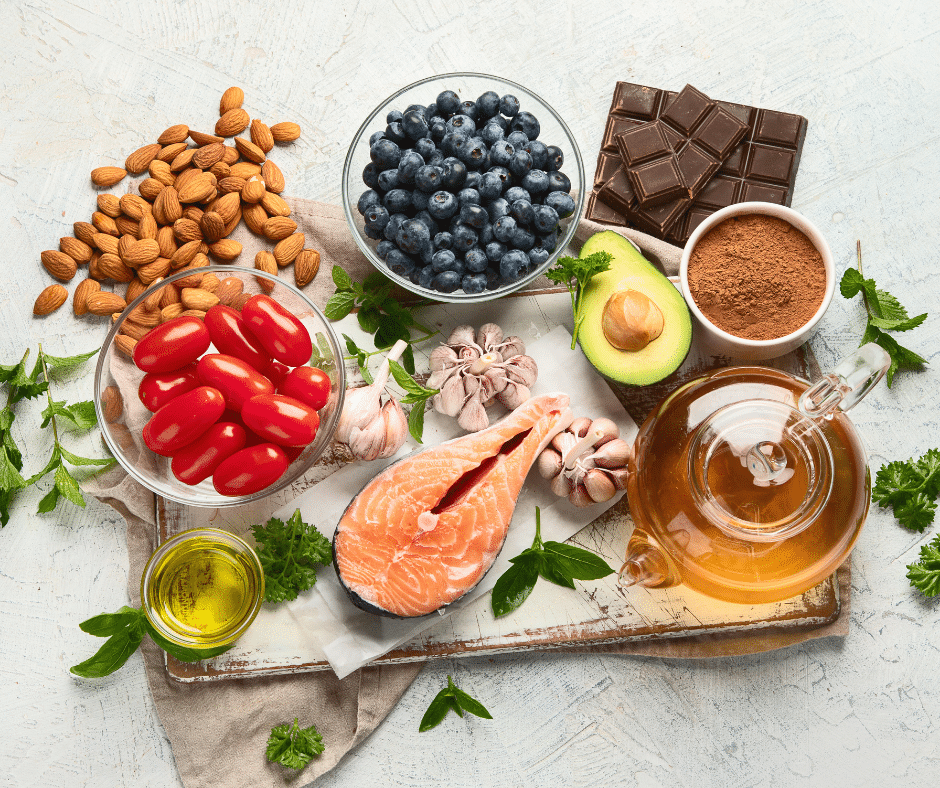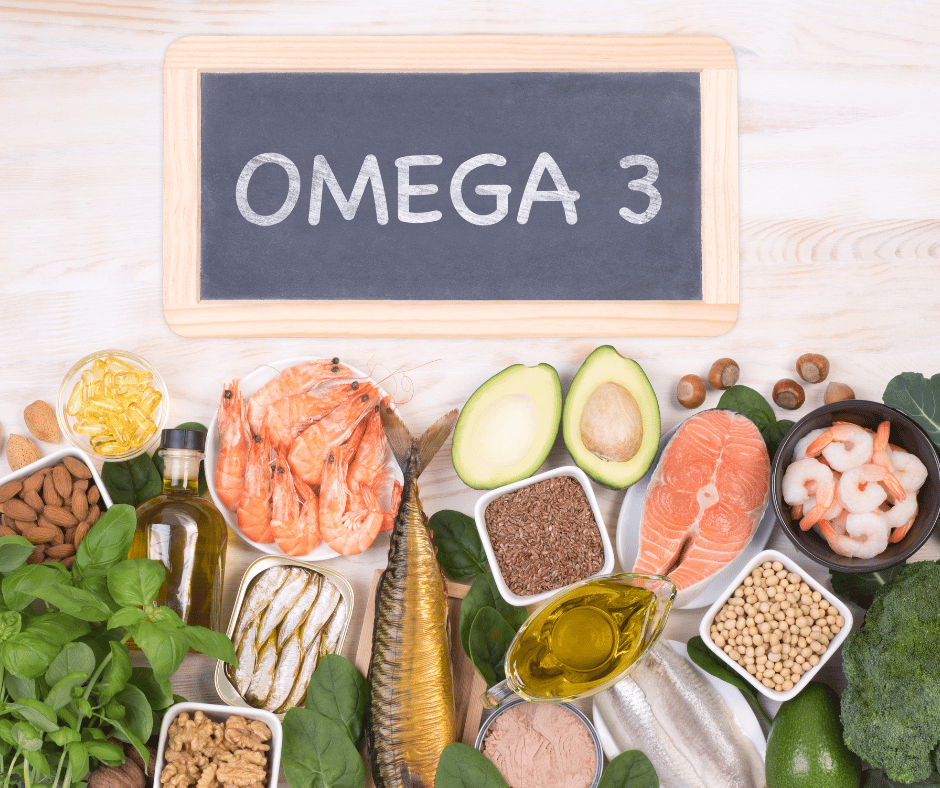Some of my most popular posts and topics with patients over the years are anti-inflammatory recipes and, of course, my anti-inflammatory meal plan.
But what are anti-inflammatory foods exactly?
To understand what anti-inflammatory foods are, you must first understand what inflammation is. You can read this post for an in-depth discussion of what inflammation is.
What is Inflammation?
But, to simplify it for you, the same process that makes your ankle swell when you sprain it happens on a much lower microscopic scale daily. Our cells suffer from generalized low-grade inflammation impeding their normal function - they still work, but not at optimal strength. Like when you've had no sleep, you work, but probably not at optimal strength, speed, or clarity. This low-grade constant inflammatory assault is the root cause of many conditions, including diabetes, cardiovascular disease, cancer, and cognitive related disorders, autoimmunity, pain, and pain-related conditions such as osteoarthritis and gout, hormone imbalance, and more. There isn't one single process in your body that chronic low-grade inflammation doesn't touch. How it manifests depends on genetic predisposition. I tell my students genetics load the gun, and lifestyle pulls the trigger.
The problem here is that your ankle swells to alert the immune system to an injury that needs to be repaired. In chronic inflammation, the immune system is a heightened state (responding to some stressors) with no endpoint. This chronic state can cause processes to break down, such as the integrity of the GI tract, causing further stress on the immune system causing more inflammation. And round and round. One easier-to-visualize example of inflammation is the inflammation or literal swelling of the blood vessels narrowing the tube your blood flows through, leading to high blood pressure. Another is inflammation causing your cells to be less receptive to hormones such as insulin, such as in diabetes. And sometimes, the immune system even begins to turn on itself, as in the case of pre-autoimmune or full-blow autoimmune disease.
Okay, so now that we know what inflammation is, what are anti-inflammatory foods?
What Are Anti-Inflammatory Foods?
Anti-inflammatory foods are simply foods that have been researched to have strong properties that tell the immune system to stand down. The immune system is incredibly complex and has a billion different pathways. Some foods have stronger effects on some of these pathways than others.

Below is a description of what inflammatory foods are in each category and why. But there is a huge caveat you need to read at the bottom of this post!
All Produce - Fruits and Vegetables
Here is the cold hard truth - almost every single produce (fruits and vegetables) item on the planet has anti-inflammatory properties, whether it's been researched or not. Plant foods are incredibly rich in phytochemicals which are part of the plant's natural defense system that humans benefit from. Different colors produce items that have different general properties, which is why there is a recommendation to eat the rainbow, the more colors, the more phytonutrients you get.
- Red: Rich in carotenoids such as lycopene and ellagic acid, which fight free radicals protecting against prostate cancer, heart, and lung disease. Other phytonutrients in red foods also benefit skin health, including wound healing and preventing skin cancer.
-
Orange and yellow: Provides beta cryptothanxin and hesperidin, which supports intracellular communication and may help prevent heart disease and improve circulation.
- Green: These foods are rich in cancer-blocking chemicals like sulforaphane, isocyanate, and indoles, which inhibit the action of carcinogens (cancer-causing compounds). They are also researched for their mood-boosting benefits.
- Blue and purple: They have powerful antioxidants called anthocyanins, believed to delay cellular aging and help the heart by blocking the formation of blood clots—a lot of research in this group for protecting from heart disease and cognitive decline.
- White and brown: This group often gets passed over as less than others when in reality, it's just as important. The onion family contains allicin, which has anti-tumor properties. Other foods in this group contain antioxidant flavonoids like quercetin and kaempferol. Mushrooms, in particular, have been singled out for fighting inflammation and carcinogenic activity.
The catch here is that research shows taking these compounds in supplement form may increase the risk of certain cancers, but when consumed in a food decrease risk of many types of cancers. This is why I recommend my patients consume ½ their plate of nonstarchy veggies aiming for at least four to five cups of veggies a day. In addition to 1-2 servings of fruit and starchy veggies as defined by their current health status and goals.
Herbs and Spices
Similar logic to the above applies to herbs and spices. The difference is that herbs and spices seem to be powerhouses delivering huge benefits in small doses. You'll get all the anti-inflammatory properties no matter what form you use, fresh, dried, ground, sprinkled, cooked, or raw. Not only do herbs and species enhance flavor, but they boost the nutrient and inflammation-fighting properties of any meal. Tumeric and garlic are two that have been heavily researched for their anti-inflammatory properties, but there is research on just about every spice and herb out there identifying high amounts of phytochemicals and antioxidants that fight inflammation. Including plain old black pepper, but not salt. So, the more herbs and spices you use, the better your food will taste, and the more you will fight inflammation!
Nuts and Seeds
Like produce, almost all nuts and seeds have been researched for anti-inflammatory properties. For this reason, I like to recommend that people rotate through different types of nuts each time they shop. However, some nuts and seeds have been identified as heavier hitters for fighting inflammation than others, primarily due to their antioxidant levels or omega-3 quantities. Omega-3 fatty acids are an important type of dietary fat that directly fights inflammation and is highest in the following:
- Walnuts
- Chia Seeds
- Flax Seeds
However, vitamin E has also been shown to elicit anti-inflammatory effects. Most popular nuts and seeds are rich in Vitamin E, including almonds, hazelnuts, brazil nuts, cashews, pecans, pine nuts, pistachios, walnuts, flaxseed, pumpkin seeds, poppy seeds, and sesame seeds.
Fatty Fish
As mentioned above, omega-3-rich foods help directly fight inflammation. Unfortunately, plant-based omega 3's have a low conversion rate to the active ant inflammatories in our bodies which are EPA and DHA. This is why it's best to maximize your consumption of EPA and DHA by consuming fatty fish.
Fish, in general, is a great source of lean protein with varying levels of anti-inflammatory properties, so I wouldn't limit my consumption of seafood to fatty fish. I recommend a couple of servings of fatty fish a week and a couple of servings of other seafood like shellfish or white fish as tolerated. I'm also a big fan of fish oil or algae oil supplements for fighting inflammation.
Whole Grains
Grains are plant foods and therefore contain the plant's natural defense system rich in phytonutrients and antioxidants that are known to benefit human health. Many whole grains have anti-inflammatory properties, including oats. The key here is to ensure that the grains you consume are whole grains. Refined grains have a strong correlation with being pro-inflammatory.
See Grocery Shopping 101: Bread Aisle
Beans
Beans are also plant foods, so they also contain abundant amounts of anti-inflammatory properties. They come with the added bonus of being rich sources of fiber which can bind harmful substances and excess hormone metabolites in the GI Tract and help eliminate them.
Teas & Coffee
The plethora of research on black tea, green tea, and coffee as anti-inflammatories is hard to ignore! Some herbal teas may have anti-inflammatory properties as well, so if you like tea or coffee, you are likely getting a delicious dose of antioxidants!
Other Foods & Anti-Inflammatory Diets
There are other foods, such as dark chocolate, that have been researched for their anti-inflammatory benefits. I will follow up on this post with a top 20 list and printable. But I wanted to start generally first so that my readers wouldn't think those top 20 were the holy grail or the only ones! Also, there are food groups that are not listed here, such as dairy, meat, and more, that I generally do recommend consumption of on an anti-inflammatory diet.
The lack of anti-inflammatory properties does not mean they don't play a beneficial role in the body, such as providing lean protein, minerals, and other nutrients. I didn't even get into cooking oils (see grocery shopping 101: cooking oils) or the causes of inflammation in the diet. There is much more than just this list! But an understanding of this will stop you from questioning every single article you read about a food group being inflammatory or anti-inflammatory, or if you should only eat salmon, etc., which brings me to my next point.
Individual Response Varies - These Foods Aren't Anti-Inflammatory for Everyone!
In general, these food do have anti-inflammatory properties, but that doesn't mean your immune system will always see them that way.
Have you heard that certain vegetables called nightshade vegetables cause arthritis symptoms, gluten sensitivity is rampant, lectins in beans are inflammatory, eggs are pro-inflammatory, or a million other reasons why you shouldn't consume the foods listed above? These things can absolutely be true. If you have a leaky gut - meaning the integrity of your GI tract's interaction with the immune system has broken down, causing the immune system to react to foods that should be benign, then your body is going to start developing inflammatory responses to foods that should be anti-inflammatory or benign. Although it's difficult to determine what initial event caused the GI permeability or leaky gut in the first place - usually some combination of acute or prolonged stress, infection, medications (antibiotics, SSRIs, Oral Contraceptives, Proton Pump Inhibitors, NSAIDs, and more), and exposure to GI-damaging agents - we can work to restore GI integrity through removing the triggers and implementing GI healing protocols based on the severity of the damage.
Eventually, many foods that once triggered inflammation for you should come back. There are exceptions to this, such as if you developed autoimmunity or markers of autoimmunity. In those cases, foods that are researched to share cross-reactivity with human tissue affected in the specific condition may need to be removed indefinitely, especially if testing reveals an immune response to those foods. One strong case of this is celiac disease and gluten. The similar strength of the research is abundant with gluten and thyroid conditions. But if my client is reacting to onions, most of the time, the end goal would be to treat that food sensitivity by healing the GI tract and restoring oral tolerance so that they can enjoy the anti-inflammatory benefits of onions for years to come!








Leave a Reply